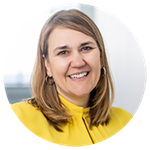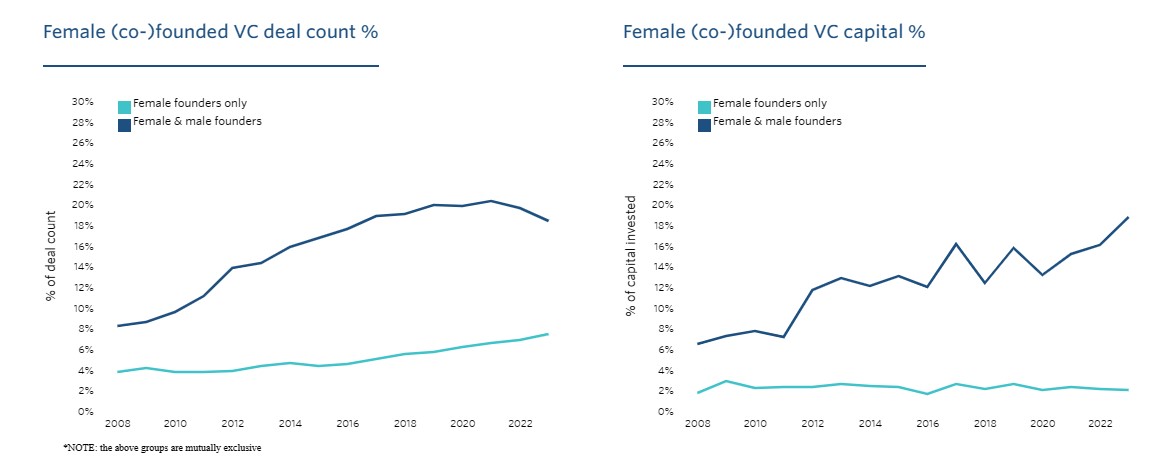The Equalize Program: Working Toward Gender Parity in Academic Innovation

Nichole Mercier, PhD
Washington University in St. Louis
.png?width=150&height=150) Kirsten Leute, MBA
Kirsten Leute, MBA
Osage University Partners
The disparities between male academic researchers who pursue innovation and entrepreneurship and their female colleagues are well documented. Beyond lower rates of invention disclosures and founding of companies than their male counterparts, female founders of startups also receive fewer venture dollars.
Pitchbook is keeping track of both the number of companies funded and the dollars invested in female founders on a dashboard it updates monthly. The figures below reflect the most recent metrics: As of May 31, 2023, female founders account for 7.4% of venture capital deals and 2.1% of venture capital dollars.

To address this disparity, in 2019 we created Equalize, a mentorship and pitch competition program for women innovators in academia.
The half-year program includes advice from industry leaders, education about entrepreneurship and networking events. The culmination is a virtual conference featuring keynote speakers, pitching sessions with judge feedback, and panels of experienced peers.
The current requirements to qualify for Equalize include:
- An academic appointment (tenured/tenure track/research) and a pending or issued patent or copyright. Postdocs currently are not eligible to apply.
- Product concept no more than five years from IND (investigational new drug) or product launch
- No formal incorporation required. However, if a startup has been formed, the company should not have raised more than $1M USD.
- Ability to attend at least one hourlong Zoom meeting per month for six months
- Technology that is a STEM innovation in one of four categories:
- MedTech (medical technology)
- Therapeutics
- Physical sciences
- Digital tools
The current cohort, which includes 23 participants, will have its showcase event on June 29. It will be a half-day chock full of information, including:
- Our keynote speaker, Dr. Sangeeta Bhatia of MIT. Dr. Bhatia is well known for her own startups and for supporting other academic women entrepreneurs, most recently through the MIT Future Founders Initiative.
- Breakout rooms for pitches in the four categories: physical sciences, digital tools, medtech and therapeutics
- A panel discussion on “Funding in a Challenging Economic Environment” with Dr. Rima Chakrabarti of KdT Ventures, Rich Ganz of Orange Grove Bio and Nancy Hong of RiverVest Ventures
- An awards ceremony for both the judges’ prize and the people’s choice prize in each category
This virtual event is free and open to all. Register at
https://equalizeprogram.org/registration/
While the Equalize program thus far has centered on female and female-identifying faculty members, the 2024 program will expand to include female and female-identifying post-docs and grad students as well. Expansion of Equalize is critical to embrace the full spectrum of academic women struggling to find their fit in entrepreneurship. Previous participants have credited the program with enabling them to create a professional pitch deck to attract investors, granting access to a world class network around entrepreneurship, and providing a safe environment that allows them to improve skill sets in the area of entrepreneurship and gain confidence. These examples are only some of the benefits that are needed by women at all academic levels.
You can find more information on the program, including the current and past participants, mentors, supporters and judges, at
https://equalizeprogram.org
Interested in helping out? Feel free to reach out to either of us! We have a variety of
committees that are looking for additional volunteers.
We are grateful for all of the support the AUTM community has provided to the Equalize program since its inception. Our next round of applications will start in October of 2023, so keep a look out for the announcements and please consider who you think might be a great participant from your institution!
Bhatia S, Hopkins N, Hockfield N. 2021. Opening the path to biotech. Science. 372:545.
https://www.science.org/doi/10.1126/science.abj2642
Bhatia S, Hopkins N, Liou S, et al. MIT women and men faculty in science and engineering as founders and board members of companies in science and technology: A report from the Data Group of the Boston Biotech Working Group. March/April 2021. MIT Faculty Newsletter.
https://fnl.mit.edu/wp-content/uploads/2021/04/fnl334.pdf
Cook LD, Kongcharoen C. 2010. The idea gap in pink and black, NBER working paper 16331.
https://www.nber.org/papers/w16331
Ding WW, Murray F, Stuart TE. 2006. Gender differences in patenting in the academic life sciences. Science 313:665-7.
https://www.kauffman.org/entrepreneurship/reports/gender-differences-in-patenting-in-the-academic-life-sciences/
Milli J, Williams-Baron E, Berlan M, et al. 2016. Equity in innovation: women inventors and patents. A Report from the Institute for Women’s Policy Research.
https://iwpr.org/wp-content/uploads/2020/12/C448-Equity-in-Innovation.pdf
Thursby JG, Thursby MC. 2005. Gender patterns of research and licensing activity of science and engineering faculty.
J Technol Transfer 30: 343–53.
Toole A, Breschi S, Miguelez E, et al. 2019. Progress and Potential: A profile of women inventors on U.S. patents. Office of the Chief Economist IP Data Highlights.
https://www.uspto.gov/sites/default/files/documents/Progress-and-Potential-2019.pdf
Toole A, deGrazia C, Lissoni F, et al. 2020. Progress and Potential: 2020 update on U.S. women inventor-patentees. Office of the Chief Economist IP Data Highlights.
https://www.uspto.gov/sites/default/files/documents/OCE-DH-Progress-Potential-2020.pdf